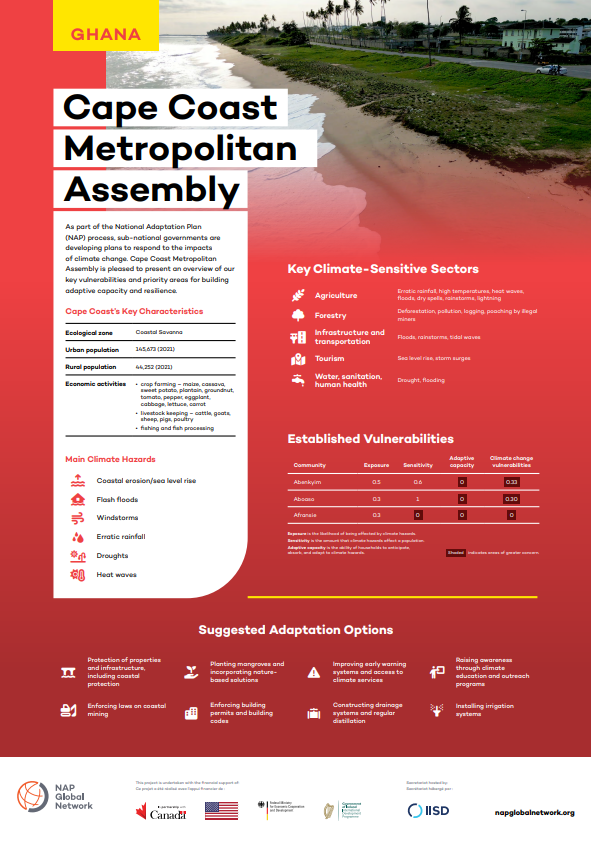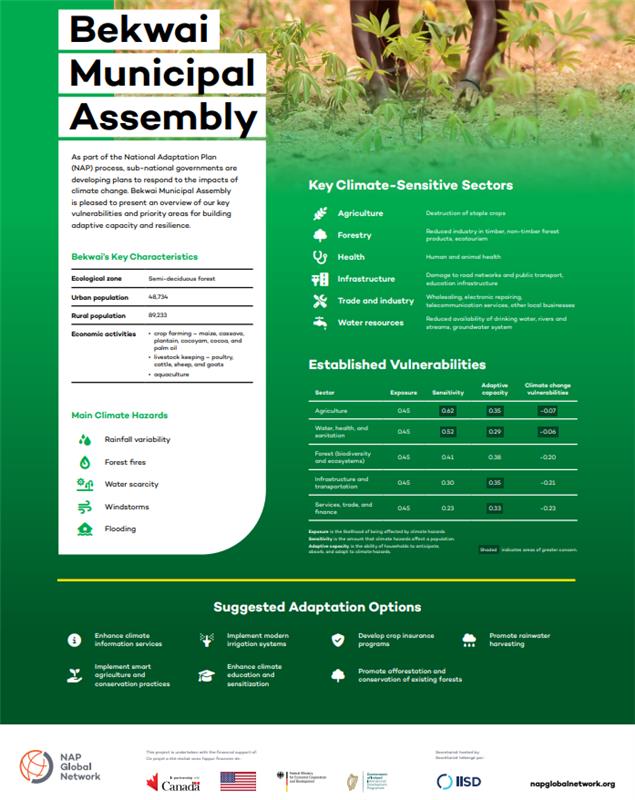Adverse impacts of climate change have become pervasive and increasingly evident across the different agroecological zones of Ghana. Key climate-sensitive sectors, such as agriculture, fisheries, health, forestry, water resources, and many more, have become particularly vulnerable. The variety of ecologies and diversity of livelihoods mean that climate impacts are not homogeneous; they are place-specific, impacting men and women in different ways. As such, there is no one-size-fit-all approach to adaptation planning—each area needs to develop its own approach.
The Government of Ghana, through its Environmental Protection Agency (EPA), has initiated its national adaptation plan (NAP) process, with technical support from the NAP Global Network. The NAP process aims to reduce vulnerability and build adaptive capacity and resilience across sectors and in local communities. A key part of Ghana’s approach has been to use innovative communication and learning tools to contribute to institutionalizing adaptation leadership in local communities.
District-Specific Adaptation Planning
Ghana’s NAP emphasizes “vertical integration” and “horizontal coordination” approaches premised on knowledge building and learning at both the national and sub-national levels. Inherent in this idea is the commitment to ensure alignment between national-level adaptation objectives and sub-national (local level) adaptation needs. To do this, the NAP process has focused on district-specific adaptation planning, a bottom-up and place-based approach using metropolitan, municipal, and district assemblies as sub-national avenues for knowledge mobilization, learning, and adaptive capacity building.
Validating this organizing philosophy, Dr. Antwi-Boasiako Amoah, the Project Coordinator of Ghana’s NAP project, highlighted that:
Climate impacts are place-specific; we cannot make assumptions, so it is important that we venture into specific places at the sub-national level to identify, understand, and appreciate the nature of impacts and extent of vulnerabilities. We need to be deliberate about making adaptation plans place-responsive and in Ghana our districts and municipalities serve as convenient avenues.
Inclusive and participatory climate risk and vulnerability assessments (CRVAs) have been facilitated in six district or municipal (sub-national) assemblies as avenues for data collection, knowledge generation, and learning. The different methodological processes employed in the CRVA have prioritized knowledge building, learning, and capacity building to deepen awareness and understanding, as well as help learners develop the requisite competencies and dispositions for effective adaptation leadership at the local community level.
Ms. Stella Okoh, Deputy Director at Ghana’s EPA and the learning lead of the Ghana NAP process, affirms the roles of knowledge building and learning in adaptation planning by noting that:
Central to identifying, assessing, and appreciating the nature and distribution of climate risks is the ability to learn, to know and understand the science and signs behind changing climatic conditions and the relative impacts of such changes on people, communities, and key sectors.… Effective adaptation, should therefore be premised on knowledge building and learning.
Thus, Ghana’s NAP has put in place purposeful processes to assess, evaluate, and anticipate drivers of climate risks and vulnerabilities across sectors. Drawing on local understanding of communities’ distinct ecological zones, they are part of a conscious effort to build both government’s and citizens’ knowledge about climate risks. Underpinning these efforts is the learning quest, which has necessitated different innovative learning approaches to facilitate Ghana’s transition to climate-resilient and low-carbon development.
Transitional Learning Innovations
From community-focused information dissemination through media engagement via animations, infographics, community theatre, and many more modes, the knowledge-building and learning quotient within Ghana’s NAP processes has been deepened by the introduction of Peer Learning Exchanges (PLEs). Three PLEs have been organized through the kind support of the NAP Global Network, and many more are in the pipeline.
Serving as the learning arm of Ghana’s NAP, PLEs are intentional learning events that bring peers from different districts, municipalities, communities, backgrounds, and sectors together to co-create knowledge and exchange learning. Participants were taken through various topics that included the fundamentals of climate change; climate impact manifestations and identification; participatory scenario analysis, risk mapping, seasonal calendar analysis, community-focused risk, and vulnerability assessments; gender-responsive adaptation planning; policy mainstreaming; partnership development; and climate-informed decision-making.
Different and innovative learning activities, such as knowledge clinics, scenario planning, role plays, cross-word puzzles, field visits, Indigenous Knowledge applications, etc., were carefully employed to engage learners in participatory and experiential processes. These activities were designed to meet different learning styles and preferences and provided opportunities for participants to develop new knowledge more effectively, as well as deepen their understanding of the climate change challenge in local communities and their roles as adaptation action catalysts.
Initial evaluation of the PLE events indicates positive outcomes that suggest that learning activities and associated pedagogical approaches have been individually beneficial and socially impactful to both participants and the districts they represent. Key areas of change include the following:
- increased climate change knowledge and a commitment to action
- anticipatory capability at the local level
- increased climate action-related partnerships and collaborations
- increased advocacy for climate-focused policies and policy mainstreaming
- increased climate communication and education programming
- increased advocacy for investment in adaptation actions
Conclusion: Toward climate-resilient development in Ghana
Perhaps the most significant change or achievement is how sub-national authorities are increasingly taking leadership of local adaptation governance. The Bekwai Municipal Assembly (BMA) in Ghana has become the face of sub-national adaptation planning by becoming the first assembly in Ghana to have a completed adaptation plan explicitly tailored to the unique needs and particularities of the municipality. The BMA is poised to implement the plan.
The BMA has worked with the EPA to establish the first-ever sub-national Climate Change Desk within the assembly to serve as the primary avenue to lead local climate adaptation governance. The initiator and champion of the Climate Change Desk—Dr. Owusu Ansah—a former Coordinating Director of the BMA could not have put it any better:
The Bekwai Municipal Assembly, like all other districts and municipalities in Ghana, has benefited from the different NAP activities. We have learned a lot; we now appreciate the extent of the climate change challenge and what it means to us. With our adaptation plan, we also know what to do. Our first step is the creation of the Climate Change Desk to serve as the focal point for climate action. We are proud of our modest achievements, and we hope to serve as an example for all other districts to learn from.
The innovative approaches used in Ghana’s NAP are contributing to a long-term change in local climate planning that can serve as an example for other countries embarking on similar adaptation journeys.
Robert (Bob) Manteaw (PhD) is a Senior Research Fellow at the Center for Climate Change and Sustainability Studies, College of Basic and Applied Sciences (CBAS), University of Ghana. Antwi-Boasiako Amoah (PhD) is Acting Director in charge of Climate Vulnerability and Adaptation at the Climate Change Department of the Environmental Protection Agency (EPA), Ghana. The NAP Global Network’s in-country support program for Ghana is funded by the government of Ireland.






